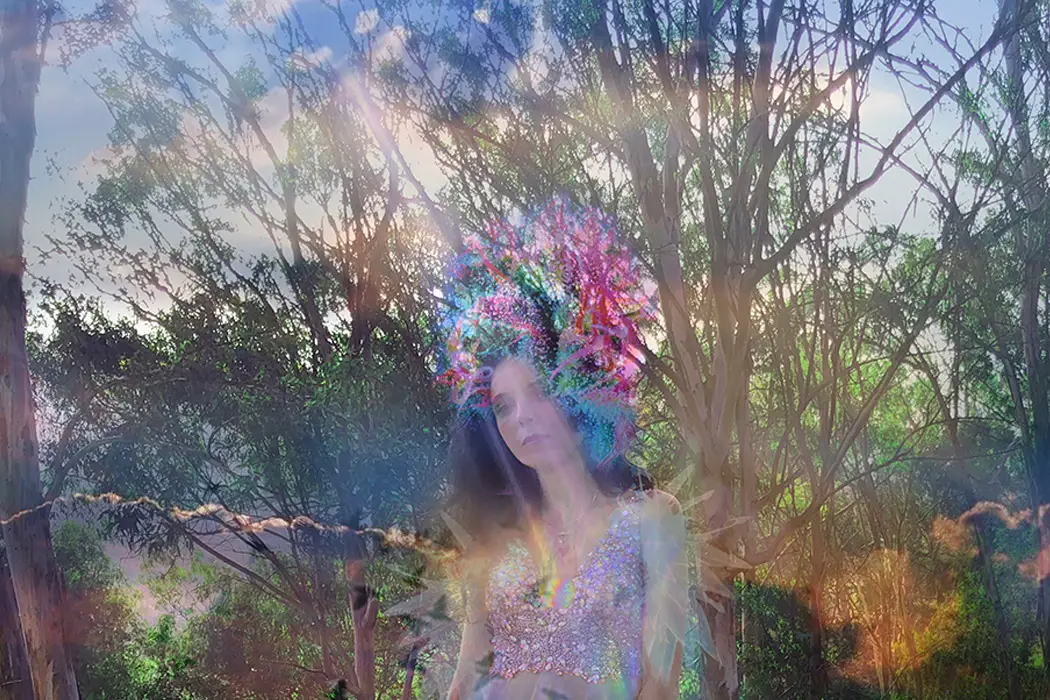La Bouquet’s Bryan Sammis discusses the pain and catharsis of writing debut album ‘Sad People Dancing’, as well as the lessons he learned along the way.
Stream: ‘Sad People Dancing’ – La Bouquet
Art, in any form, is first and foremost a form of catharsis: It allows us to channel our energy and emotions into a body of work, and gives us the push to heal. When it comes to music, perhaps intertwining these thoughts and feelings with a funky guitar riff makes it all better. Los Angeles band La Bouquet do exactly this with their debut album, Sad People Dancing. The record creates a space for those who have been hurt, those who have admitted their faults, and those who are learning to move on.
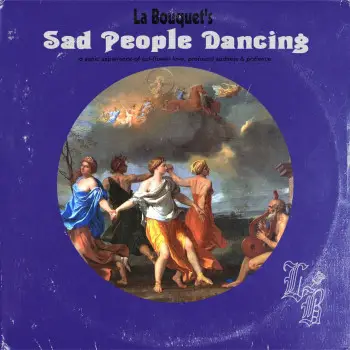
Comprised of former The Neighbourhood member Bryan Sammis (also known for his work as Olivver the Kid), Jake Lopez, and Drew Bruchs, La Bouquet formed over a shared love of pop, R&B, and expressive emotion. Released April 26, 2019 via Amuse Records, their debut album Sad People Dancing is a long-awaited, heavily anticipated labor of love: The majority of the record was recorded alongside 2017’s debut EP Heavy Sunshine, but delayed for various label and marketing reasons. Now finally available for public consumption, the album features carefully woven and curated songs with themes of broken relationships, confidence, and growth. Whereas Heavy Sunshine offered a sneak preview of La Bouquet’s art and artistry, Sad People Dancing truly displays the band’s talent, their integrity, and the sort of momentum they hope to maintain.
The title ‘Sad People Dancing’ perfectly describes the album’s sound and texture: The lyrics are driven by sad experiences, but the upbeat, ‘80s synth inspired music keeps listeners on their feet, wanting more. In naming title track “Sad People Dancing” one of our Editor’s Picks this February, Atwood wrote, “La Bouquet manage to inject light and warmth into our ears, while still immersing us in irrefutably dark emotions. Their balance of opposites is praiseworthy, but it’s the utter fragility of “Sad People Dancing” that lends this song its tremendous depth and value.” The album touches on a few heart-wrenching emotions, while also creating an intrinsic desire to learn from the hurt and move forward in life.
Atwood Magazine sat down with La Bouquet’s lead singer Bryan Sammis to discuss the process of writing these songs, informative experiences in his personal life, and his career as a musician. Although Sammis looks like your average “rockstar” (as described in the song “Bad News,”) his overflowing passion for songwriting and making new content definitely separates him from “the rest.” A lover of dancing and calling himself a loser, Sammis is eager to create meaningful songs about anything and everything he comes across.
Get to know La Bouquet in our exclusive interview, and don’t miss their Los Angeles album release show at The Troubadour on Saturday, May 18 alongside LUMiN, Fever Joy, and Wavy Trees!
The album at a surface level slaps, but also, if you sit down and listen to it, you can analyze it: The songs still actually mean something.

A CONVERSATION WITH LA BOUQUET
Atwood Magazine: I understand you guys had the album all ready and put together a while back, was there any reason for its release to be pushed?
Bryan Sammis: Yeah, it was completely business stuff, which is kind of a bummer because you have so much fun writing and making an album. We signed to an indie record label last year, and we were like, it’s go time, and we were so ready to put out the album, and then the label got bought by a major label. The major said they would only take on artists their roster who are already making money, rather than something that’s developing, so we got dropped from them. After getting signed to another label, they wanted to push it another month and to me I was like, “not another month!” but to them, it’s like, you’ve only been working with us for like four months!
Yeah and in your head it’s all adding up into a lot of time, and then you get all excited when you finally think it’ll release and then it’s pushed back again.
Sammis: Yeah, I didn’t listen to it for a while after we finished it because I wanted to go back and listen to it again with fresh ears and try to put myself in the mind of someone else who’s never heard it before.
That’s cool. When you heard it again, was there anything you wanted to change?
Sammis: It’s funny, there are things that we do live that I think are technically better. This is also the same reason why a lot of people’s favorite albums by bands are their first album, because with your first album, you don’t fully know what you’re doing, and that’s cool. Once you start knowing a little too much, things can seem a little more contrived and a little too thought out because it’s like, “I know how a song’s written–you’re just like verse verse chorus, verse verse, and so on.” On this album we have a lot of songs that are five minutes long, and I can’t see us doing that right now. We’ve written some songs in rehearsal and have a bunch of new material, but it’s all four minutes tops. I think if you average out the song length on our album, it would probably be like 4 minutes to 4:30, which is pretty long — most bands don’t do that.
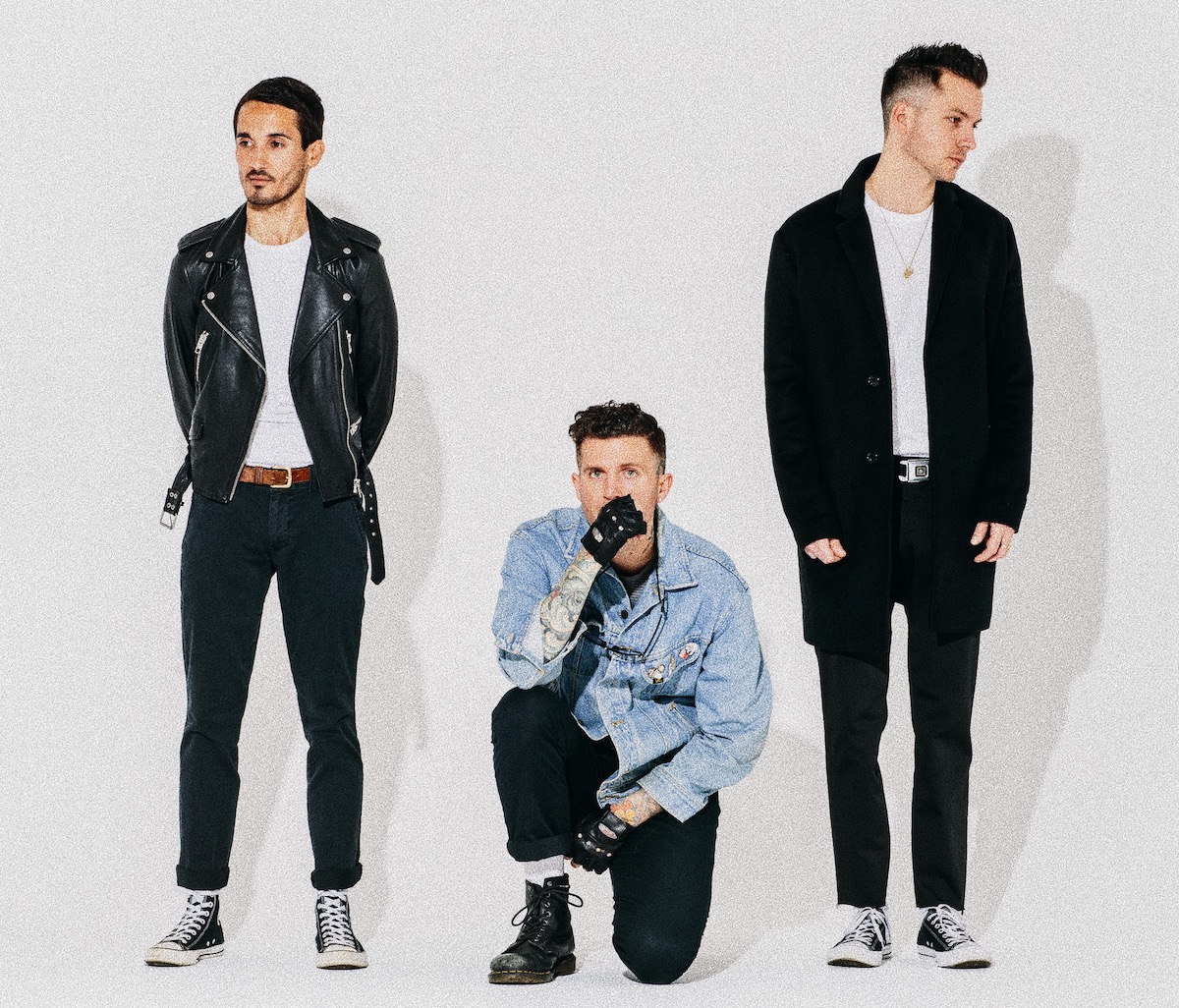
The EP Heavy Sunshine was created around the same time as the LP - what made you want to separate the two?
Sammis: It was all supposed to be one album. Because it was taking so long, I was like, we have to put something out. At the time, we only had two singles, “Loveless” and “Loser Baby.” I came up with this plan of taking two songs off the album, make an EP with a total of four songs, put that out, and then put out a little live thing (Sunshine Sessions) just to have stuff coming out.
Nowadays, you have to stay relevant. Even bands like The 1975, who are like the biggest band in the world probably, they’re coming out with another album this year, and it makes sense because they understand that’s how it works. I’m constantly talking to management and labels saying that I want to just keep doing stuff. I was talking about recording the next EP and they were like, “Your album isn’t even out yet,” and I was like “I know but it’s 2019 – you have to keep moving.” You have to keep doing stuff. Especially when you’re getting older – you know I’m 28, and 18-year–olds aren’t waiting. They’re putting out a song a month, an EP, and then two months later another EP, and then an album. They’re not following the old antiquated rollout structure of what it used to be – around 18 months. You can get away with that now if you want to, but it’s cool to see a band say, “We could get away with it, but we don’t want to.” We enjoy making music and people are going to enjoy it, so why wouldn’t we – especially if we have all the resources and have the energy and are still pumped up on it?! That’s kind of how I feel.
Does that add any pressure to you? The need to write something and come out with something quickly?
Sammis: No, it just comes. We’re ready. Especially because it’s been so long, it has made us better. We can’t stop writing songs, nor do we want to. Like, we get in rehearsal for a show, and Jake is setting up his guitar and starts playing a riff and I’m like, ‘Woah what’s that?’ and I’ll ask him to play it again, I’ll start recording it, then next thing you know we’re talking about it in the group chat for weeks. It’s exciting, and that’s what I want. At the end of the day, we all started making music ‘cause it’s fun. When we’re in the mood, it doesn’t feel like we have to do this.
Was there a reason why you guys picked specific songs for the EP versus the album?
Sammis: “Loser Baby” and “Loveless” we put out as singles, on the EP and the album because we’re thinking, people who are listening to you (who could potentially be fans) don’t know who you are yet, so not putting our “best songs” on those records would sort of be a disservice to us. If somebody new is just finding out about us, and then hears “Loveless” or “Loser Baby,” they might be like, “Oh this song slaps!” you know? The other songs, it was mainly sequencing – to feel good. The first two songs were more ‘80s indie rock, then the second two songs were more electronic and dark. “Loser Baby” and “The Puddle” had more electronic elements and were bigger and more epic. The first two were more sunny, ‘80s [influenced], and had a large contrast compared to the second two.
You’ve mentioned before that La Bouquet is different from your previous musical projects in various ways - talent level, trust, etc. In what ways do you think Sad People Dancing shows those differences?
Sammis: Well, not speaking about me first, Jake is like the guitar work of the future. He doesn’t play guitar like people play guitar. People always ask him for the tabs for our songs and he doesn’t even know them. He just sits there and detunes his guitar until it’s in a tuning that no one has done before, he puts a capo somewhere, and then plays. It’s so cool and really different. Maybe some people–not all people–are sick of guitar bands. When you listen to alternative radio now, there’s not that many guitar heavy bands. There’s a few, but you’re not listening to these bands and going, “that riff or guitar line is sick!” like how they used to be. I think music is evolving and Jake is part of that. Drew is the nicest person in the world and is very good at everything, so, it’s a blessing to write music with him. All of his ideas are good but he also knows when to fill in a spot. On the album he only played bass, but going forward, he’s going to play guitar and other stuff. For the bass of the bridge for “The Puddle” and “Heavenly” we were like, what do we do here, and he was playing something in the back of the room and I was like, “wow that’s sick.” He’s completely modest about it, too. I always want to, and even moving forward, to treat my voice like an instrument. I’m not a naturally gifted singer–I’m still not amazing. I like to change the timbre of it, I use a lot of effects live, I mess with the pitch, and we do a lot of layering. Jake and Drew allow me to do that by holding down the rest of the work, while I’m able to experiment everything else.
Since you’ve been working in music for such a long time - were there any specific moments you remember that you think truly shaped the confidence you feel now?
Sammis: Touring is a big one. Just playing and singing live. Looking back at previous performances, I wasn’t terrible but I can tell I couldn’t hear myself, I’m flat or sharp, or something else. Performing night in and night out has helped. My day job is writing music for commercials and I’ve written thousands of songs in the past couple years so you’re only going to get better the longer you do things. Now when we go to write songs for us, I’m like, cool I just wrote a reggae song, a country song, or a pop song, so when I get to write what I want to write, it’s almost like I went to the gym.
Talk about “Heavenly” as an opener to the album. I really love that song -- I think it’s beautiful. What made you want to put it first?
Sammis: My other project, Olivver the Kid, had a song called “Hell.” Then I wrote “Heavenly” which is supposed to be the resolution for that song. “Hell” is about heartbreak and really needing someone, and “Heavenly” is about time passing and realizing sometimes you’re better off without each other. The lyrics are “it’s heavenly without you, it’s heavenly without me, it doesn’t need to be what we thought.”
It’s kind of like the closure that you need to move on.
Sammis: Yeah, closure. It’s funny to say because it’s so simple, but it’s just time. Also just sonically, too–we wrote that really cool intro, which came last minute. We had a horn player come in, which is a big theme on the record. We have the horns on this track, “You Only Need Me When You’re Blue” and “The Sound of Me Dying,” which is like the beginning, middle, and end of the record. So yeah, lyrically, that’s how I wanted to start it out. If anyone knows me, it starts out as, I moved on. Things get better.
That’s great. So in the song “Bad News,” you’ve mentioned before in previous interviews that it’s a plea for creativity and individuality in the music industry. In what ways do you think the industry fails to be honest?
Sammis: The concept of a “rockstar” mentality. It’s funny, someone did a write up of our show once and he was like, “They have a very ironic song where they say, haven’t we had enough god damn rockstars, while he looks like a rockstar on stage.” It’s that idea that if you want to be a rockstar you have to look a certain way, or make a certain type of music. Being in LA, and seeing a lot of bands, I’ve noticed they all dress the same, the music sounds the same–there’s no real personality here–I feel like it’s because they think you have to be this way. I was working with a couple younger guys and I was trying to push them out of their comfort zone, like, hey, you need to be a little more like you. The only thing from your music that I’m not getting fully is you.
“Pity Party” is one of my favorites, just because I could really relate to that anxious feeling you get on your birthday, when everyone is paying attention to you. How did that song come together?
Sammis: That song was actually one of the first that we wrote. It was originally going to be for a different project. Before we did the La Bouquet album, we were making an EP for another band we were gonna call Shy, or something, and that’s the only song from the EP that made the record. It’s kind of me poking fun of myself. Look, I know how the tracklist looks–it feels very sad. Once we were well into writing the record I was like, we need to have a song on here where I poke fun at myself a little bit. I totally understand the record sounds like one big pity party.
So when you wrote that was it from a specific experience? Or was it more of a general feeling?
Sammis: There’s two–I lived in New Orleans for a while, and was in a relationship with someone long distance. We broke up because it was long distance. There’s another line that mentions a not so serious relationship with someone in New York. The song is kind of about those experiences but taking them from a point of like, ‘relax, everyone goes through these things.’
And reassuring yourself that it's not the end of the world.
Sammis: Yeah, and me acting like it is the end of the world. It’s about the sort of narcissism that goes into writing a song, how it’s about me and my relationships. “Pity Party” is about sitting back and making fun of myself.
Out of curiosity - there’s a French monologue in the beginning of “Pure Heartbreak.” I felt like this also ties in with La Bouquet being French -- is there any particular meaning behind this?
Sammis: Yeah, that’s definitely why that went in there. If you know French, that story is about nothing. Someone I know was taking a French class and sent it to me, and I think the story is about someone going to the store and buying apples. I thought it fit the vibe and we wanted to put something there as an intro. We wanted you to hear something like that when you first pressed play. It just sounds cool. We also have a little French in our “Loveless” music video, which we kind of want to have as just a reoccuring theme. I also want to do something in a future song with kids yelling two words in French, so then we’re suddenly tying a lot of these threads together in our songs.
In “Sad People Dancing” it’s literally about not thinking about your feelings and dancing it all away. Despite songwriting, is there some kind of hobby that does that for you--the ability to just forget about things and live in the moment?
Sammis: Definitely dancing. That’s something I’ve really grown to like. I did the choreograph scene in that music video, and I danced a little bit in the “Kiss Me, Kill Me” video and the “Loveless” video. I have an idea for a future music video that involves a choreography scene. I’ve just really grown to like it because it’s something that growing up, at least for me, people are not expecting me to be someone who’s like, “hey, let’s go dancing.” The stigma is someone looking at me and going, “let’s have a beer, man.” I just went the other night with a group of people, and for a minute I left the group and went out to the dance floor by myself. It’s fun, especially in a situation like that where I didn’t know anyone around me–so I could be whoever I want to be, I could do whatever I wanted to do–there’s no expectations.
Have you ever been to a silent disco?
Sammis: No, but I really want to!
Yeah, that’s what the “Sad People Dancing” music video reminded me of!
Sammis: I would love to go to one of those. I’m just curious as to what music they would play… ‘cause if it was EDM, I don’t think I’d have as much fun as if it were soul. If they played old, soulful, funky stuff, I would be in my zone. I’d also love to go to one of those things and not wear headphones and just watch. It sounds creepy, but imagine sitting at a bar and just seeing people’s rhythm and guessing what they’re listening to.
I love people watching, so that would be fun. “Loser Baby” is definitely a song that has been in the works over the years. Do you think the final result is different from your initial vision of it?
Sammis: The bridge and the pre chorus used to be different. The rest was always the same. I’m not big on harping on stuff–I’m more of a first thought, best thought, type of person when it comes to music. If you start to overthink it, you can ruin it. But that bridge, we wrote it like, four or five times. I think the end result is definitely the best, out of all the options we had.
A lyric in “Loser Baby” goes, “I've been saved from the way I was caged / I've been saved, first I caved, then I said / (Coming to terms with the fact that).” I definitely took that as, once you admit to who you are or what you’ve done, you’re free from that feeling. Do you think the same goes for the catharsis in songwriting? Once you write down your feelings, there’s a sort of relief?
Sammis: It’s about that, but it’s also like that moment in 8 Mile when Eminem says everything negative that someone could say about him and then he goes, “now tell them something they don’t know about me,” and they don’t say anything. For me, it’s about coming to terms with the fact that I don’t come from a traditional job, I don’t look very traditional, and people just look at me and say, what a loser. But I’m saying, hell yeah, I’m a loser.
This song also talks about being able to being to pinpoint mistakes and being mad at yourself, but also learning from what you did wrong. How would you take this sort of advice and apply it to a romantic relationship?
Sammis: Well, still learning–still figuring that out. It’s important to be honest with yourself and your shortcomings. What do you bring to the table, whether that’s in a relationship, friendship, whatever, and know what you don’t, and how you can improve on that. I look back at some of my friendships and and look at myself like, you’re an idiot. I’m either saying the wrong things, or not being there for somebody, and asking myself, why? What were you doing? You weren’t doing anything… yet you’ve ruined this good relationship. There’s this toxic, self-destructive circle that people can get in, where things are going well, and then their self conscious will sabotage themselves. A lot of people are so used to working for something, that when they have it, they don’t know what to do with it.
One of my favorite songs on the record, “Scream My Name,” seemed like a continuation to “Kiss Me, Kill Me,” in a sense that both relate to someone having so much power over your emotions. Were they written around the same time?
Sammis: They were definitely written around the same time–I think “Kiss Me, Kill Me,” was first. “Scream My Name” is about looking back at certain relationships and wondering… why were you in that? Why were we doing that? In the first verse I’m painting a picture of a relationship that’s boring. We don’t have any chemistry so what are we doing here? The second verse is about people using people when they need them, which goes back to “You Only Need Me When You’re Blue,” and only needing someone’s company when they’re sad. It’s a whole song about trying to figure out why I’ve let that happen, or people in general, let that happen. Also realizing that people are so consumed with being in love or trying to find love. I feel like it ends up ruling their whole lives. I think it’s perfectly fine if you’re not. I don’t think it’s something people talk about. I’m writing a song about it, and in the pre-chorus I talk about how those thoughts of wanting to find love get in the way; looking back on that specific situation, it did get in the way for me, and I got consumed in talking to someone and doing something that was not good for me at all. I ended up losing my focus, too. I wish someone just sat me down and was like, hey, just do you.
Yeah, and be like, hey, you don’t have to keep looking for someone.
Sammis: Yeah, a lot of my friends are getting married–my brother got married, I was the best man in two weddings, groomsmen in six weddings–so it’s just like… if someone would’ve sat me down and said, hey, focus on what you want to focus on, focus on your art, and eventually, that person will come. Don’t worry about it.
Do you think, in a sense, loneliness is underrated?
Sammis: Yeah. I’m a different, better, and stronger person because I’m not only “relationship alone,” but literally alone. I’ve lived alone for such a long time. You have time to really figure yourself out and know who you are. There are people who are older than me who are in relationships and it’s like, I don’t know who you would be without that relationship. That’s a scary thought. Those things don’t last forever. I know someone whose parents got a divorce and they’re in their fifties, and now their mom is really trying to find herself. It’s because your whole life was based on one thing, you know? If you find out who you are first, then bring it in with someone, it’ll probably be one, a healthier relationship, and two, if it ever ends, god forbid, you’re going to be okay. I have a lot of friends who are older than me and still single and I’m just like —
You do you!
Sammis: Exactly. But some people are like, that’s so sad, I hope he finds someone. I’m like no, if he wants to. Maybe he will, maybe he won’t. Maybe he doesn’t want to. If he’s completely happy the way he’s living his life, then who cares.
I’m a different, better, and stronger person because I’m not only “relationship alone,” but literally alone.
“The Sound of Me Dying,” the last track, is a very heavy and dark one. I feel like with the added fact that it’s right after 1990 makes it hit even harder, considering that one is really about encapsulating a lot of insecurities. What was it like writing this song for you?
Sammis: That song wasn’t actually that hard to write. I just let it all out. It’s kind of saying, what are you waiting for? Anyone could die at any given moment, literally as we’re sitting here, seconds and minutes and days go by and years go by, we just get older and closer to death. Why would I want to wait and tell someone something when I could get hit by a bus at any given moment, you know what I mean?
So there is an overall positive message?
Sammis: Yeah, that song feels very negative, but that song, to me, is very positive. I listen to it and I’m like yeah, what am I waiting for? If I want to do something, I’m going to do it. In the bridge, I talk about trying to numb that, because I definitely used to. Some days are harder than others, so maybe I still do. The very end of the song are the first lyrics I wrote and recorded. I had a poetry club and it was one of my favorite poems, so when I really started recording music I recorded it on Garageband with a couple piano chords and some vocals. I thought it would be an appropriate end to that song. The whole thing is supposed to feel like an end and a beginning, because the last song loops back into the first song.
There seems to be an overlying theme of growth in the album, so do you think writing about these situations helps you move on, learn, and grow from them?
Sammis: Yeah, totally. I’m a big believer of leaving it there. Not fully, obviously, you’re going to have nights where things are going to be harder than the night before, or, things come back. “Pure Heartbreak” and “Loveless”… those songs saved me. I was in a bad spot–super self destructive out in New York after a relationship had ended. I came back to LA and wrote those two songs and it made me happy. I remember the first night we got a mix of “Loveless” and I put it on the car and was like woo! I rolled down my windows and was like, this is sick! I’m sitting there, laughing and smiling because of something so cool, and it was born from something that caused me so much fucking pain. To go from being blackout drunk in New York to crying in my friend’s house, to in my car blasting this song, is like wow, I did kind of leave it there and now when we play these songs live, I feel overjoyed.
In terms of future music, would you still like to write about these sort of subjects or is there something else you’re interested in?
Sammis: I definitely think it’ll change, depending on project to project. We’ve already written a couple songs for whatever’s next–I want to do an EP but we’ll see. They’re already about different things. There’s one that’s very poetic, so I’m not too blunt or straightforward about the message. There are songs where I want to write about friendships and not relationships. I still want to write about being in a band. I have ideas of things I want to write about and a list of melodies and lyrics or song names. I’m definitely not opposed to anything. If someone were to say, write the album tomorrow, I’m not necessarily super bummed out about any romantic relationship, so I wouldn’t write about that. I’m good, and I’m happy with where I’m at. There are other things that are on my mind that I’d write about.
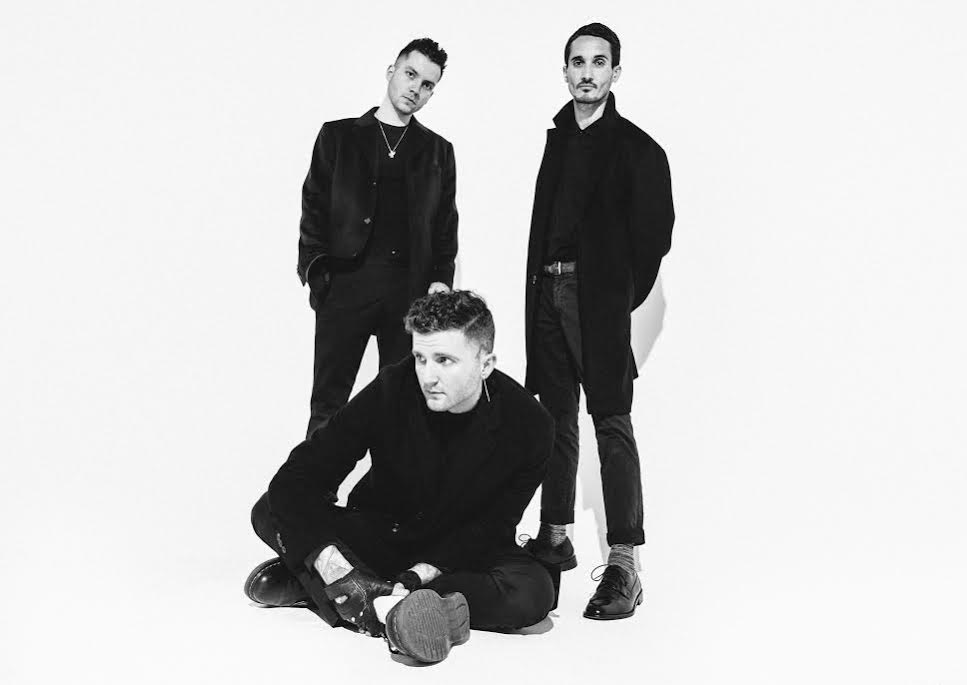
What do you want listeners to grasp from this album, if anything?
Sammis: This might sound egotistical, but that art is not dead. Especially in the alternative world, obviously there’s people doing great things, but alternative music and rock music is kind of dying because people aren’t taking chances. Not “dying” — but falling to the wayside to other forms of art. We can write some bangers too, and have a song that’s really catchy, but that’s almost like a quick fix. Whereas, if we create something that’s artistic or means something, it could last years, which I think that’s what people really liked about with The Cure or Nirvana. I think about the amount of people who have really come up in the past few years and have created something new and fresh in the alternative world, and the list is pretty small. So, the album at a surface level slaps, but also, if you sit down and listen to it, you can analyze it: The songs still actually mean something.
— — — —
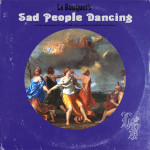
Connect to La Bouquet on
Facebook, Twitter, Instagram
Discover new music on Atwood Magazine
? © Joshua Schultz


